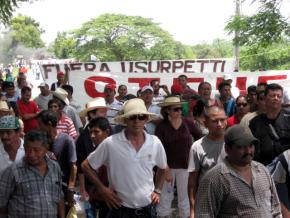U.S. friends carry out a coup
In toppling President Manuel Zelaya, Honduras' landed elite and U.S.-backed military are trying to reassert their traditional grip on power.
MILITARY OFFICERS and right-wing forces in Honduras with long ties to the U.S. government organized a coup to topple the democratically elected president at the end of June--and the reaction of the Obama administration was lukewarm criticism at best.
President Manuel Zelaya was rousted from his bed in the early-morning hours of June 28--the day that Hondurans were supposed to vote on a nonbinding referendum on changing the country's constitution--and forced onto a plane that took him to Costa Rica. Other members of his government were detained throughout the day.
Leaders of the right-wing majority in Congress claimed that Zelaya had quit voluntarily, displaying a resignation letter that was quickly exposed as a forgery. Roberto Micheletti, the Speaker of Congress, was sworn in as interim president.
The coup was an attempt by the country's elite to reassert their traditional grip on power after Zelaya had begun following the example of left-wing Latin American presidents like Hugo Chávez of Venezuela and Evo Morales of Bolivia--in particular, with his proposal to convene a constituent assembly to rewrite Honduras' constitution.

Zelaya is hardly a radical. He comes from a wealthy landowning family and ran for president as the leader of Liberal Party, one of two main parties representing Honduras' elite. He came to office as a supporter of the neoliberal Central American Free Trade Agreement, for example.
But he has moved closer to Chávez and other more radical political leaders in Latin America. Last year, for example, he led the country into the Bolivarian Alternative for the Americas, a coalition of Latin American countries that includes Venezuela, Bolivia and Cuba.
WITH ZELAYA on a military plane out of the country last Sunday, coup forces imposed a blackout on Honduran television, radio and the press.
Nevertheless, according to reports, large numbers of people learned of the military's actions and poured into the streets to show their support for Zelaya and demand his return. Members of the left-wing Democratic Unification Party burned tires and held a vigil outside the presidential palace, according to the news agency Inter Press Service.
In the following days, many U.S. media accounts reported contending pro- and anti-Zelaya demonstrations in the capital of Tegucigalpa, but the unions and popular organizations are plainly on Zelaya's side.
Demonstrators continued to brave the crackdown by police and army troops, building traffic blockades in various parts of the country. The teachers union announced an indefinite strike in primary and secondary schools, and other reports confirmed walkouts and actions by workers around Honduras.
Zelaya's ouster was roundly denounced across Latin America, even among conservative political leaders like Costa Rica's Oscar Arias. The Organization of American States (OAS), representing the countries of North and South America except Cuba, immediately issued a statement condemning the coup.
By midweek, the OAS had called for Zelaya to be restored to power within 72 hours. Micheletti and the coup makers rejected the ultimatum. "[Zelaya] can no longer return to the presidency of the republic unless a president from another Latin American country comes and imposes him using guns," Micheletti told the Associate Press.
Though the U.S. went along with the OAS statements, its overall response has been contradictory.
As reports of Zelaya's ouster emerged from Honduras last Sunday, Secretary of State Hillary Clinton condemned the coup and called for respect for "constitutional order." But at almost the same time, Dan Restrepo, presidential adviser to Obama for Latin American Affairs, was interviewed on CNN en Español, where he explained that the U.S. was communicating with coup forces, and was "waiting to see how things play out."
Speaking for U.S. conservatives, the Wall Street Journal celebrated the coup, claiming that the military was merely following an order of the Supreme Court--stacked with creatures of the elite--in forcing Zelaya out of office. The Journal did admit, however, that the coup makers "would have been smarter--and better off--not sending Mr. Zelaya into exile at dawn."
But, of course, the manner of Zelaya's ouster perfectly illustrates the way that power has been wielded for decades in Honduras by a small landed oligarchy and its U.S.-backed military. As Eva Golinger, a Venezuelan-American writer, put it:
Honduras is a nation that has been the victim of dictatorships and massive U.S. intervention during the past century, including several military invasions. The last major U.S. government intervention in Honduras occurred during the 1980s, when the Reagan administration funded death squads and paramilitaries to eliminate any potential "communist threats" in Central America. At the time, John Negroponte was the U.S. ambassador in Honduras and was responsible for directly funding and training Honduran death squads that were responsible for thousands of disappeared and assassinated throughout the region.
During the week, U.S. officials were careful to sound sharper criticisms of the coup makers. But they steered clear of tough action, beyond suspending ties with the military. On Thursday, for example, U.S. officials put off a decision to cut off economic aid to Honduras unless Zelaya was returned to power.
This stalling is telling. With Honduras dependent on the U.S. economically and the Pentagon's long relationship to Honduran military leaders--several conspirators were trained at the notorious School of the Americas at Fort Benning, Ga.--Washington could have stopped the coup makers in their tracks. It chose not to.
The claims of U.S. leaders to respect democracy--issued so loudly in the case of Iran--should be judged against this record of weak rhetoric and inaction on Honduras.


